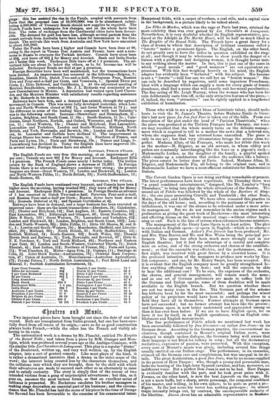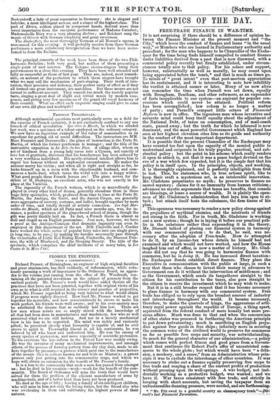The Covent Garden Opera is not doing anything remarkable at
present. The latest performances have been repetitions. On Thursday there was "a grand combined entertainment," designed, like Mr. Lumley's "long Thursdays," to bring into play the whole attractions of the theatre. The second act of Fiddio was followed by the whole of the Barbiere di &gig- ; the one piece presenting Cravelli and Tamberlik ; the other Boaio, Mario, Ronconi, and Lablache. We have often censured this practice in the days of the old house ; and, according to the partisans of the new es- tablishment, it was one of the abuses to be reformed under a more artis- tic management. But we do not remember in the ancien regime such a profanation as giving the great work of Beethoven—the most interesting and affecting drama on the whole musical stage—without either begin- ning or end. Such is the fate of reform whenreformers become ministers. The management of the Drury Lane Opera is at least active. The plan is extended to English opera—or opera in English—which is to alternate with Italian and German. Auber's Fra Diavolo has been produced; Mr. and Mrs. Sims Reeves and Mr. and Mrs. Weiss being the principal per- formers. The opera has often been much more strongly cast in our English theatres; but it had the advantage of a careful and complete mise en scene, and of the strong orchestra and chorus of the establish- ment; so that the ensemble was effective, and the performance, on the first night, was received with great favour by a crowded house. It is the professed intention of the managers to produce new works by Eng- lish composers; and one, by Mr. Henry Smart,. bas been accepted. But it is evident that the English company must be greatly strengthened be- fore anything effectual can be done ; and will the concern be able to bear the additional cost ? To be sure, the expenses of the orchestra, the chorus, and general management, will remain much the flame; and as one set of German performers are made to suffice both for the German and Italian operas, some of them doubtless will be made available in the English branch. But we question whether there are not too many irons in the fire. The German part of the scheme has hitherto been by far the most successful ; and perhaps the wisest policy of its projectors would have been to confine themselves to a field they have all to themselves. Former attempts at German opera have not succeeded ; but no former attempt has been like the present ; and German opera is now better understood and appreciated among us than it has ever been before. If we are to have English opera, let us have it too by itself; in an English operahouse, with an English eeta. blishment and English management. The fine performance of Fidelio which we mentioned last week has been successfully followed by Don Giovanni—or rather Don Juan—in its German dress. According to the German practice, the conversational re- citatives, though contained in Mozart's original Italian score, were changed to simple spoken dialogue, the Germans being well aware that their language is not fitted for talking in song ; but all the declamatory recitatives, expressive of passion, were preserved. With this exception, every note of Mozart's music was given, including several fine things usually omitted on our Italian stage. The performance, in its ensemble, evinced all the German care and completeness, but was unequal in its de- tails. The great desideratum, a good Don Juan, was by no means supplied in the person of Herr Pasque ; who, though a young and personable man, lacks the bearing of the high-born Spanish cavalier, and has, moreover, an indifferent voice. But a perfect Don Juan is not to be had. Herr Pasqua is evidently familiar with the part, and he took great pains with it. Ferules, on the other hand, is now the best Leporello on the stage. He is not a mere buffo, but a sharp, astute personage, the congenial confidant of his master, and willing, in his own sphere, to be quite as great a pro- fligate. In the last scene his terror has nothing grotesque ; its almost tragic intensity bring out, by contrast, the unconquerable audacity of the libertine. Donna Anna has an admirable representative in Madame
Ruderialorff, a lady of great reputation in Germany : she is elegant and ladylike, a most intelligent actress, and a singer of the highest class. The part of Elvira, seldom placed in competent hand; derived more than usual importance from the energetic performance of Madame Caradori; Mademoiselle Bury was a very pleasing Zerlina ; and Reichart sang the music of °Melo with German simplicity and great sweetness.
The ZaubeVlidet the most thoroughly German of all Mozart's operas, is announced for this evening: it will probably receive from these German performers a more satisfactory interpretation than we have been accus- tomed to from the Italians.



























 Previous page
Previous page